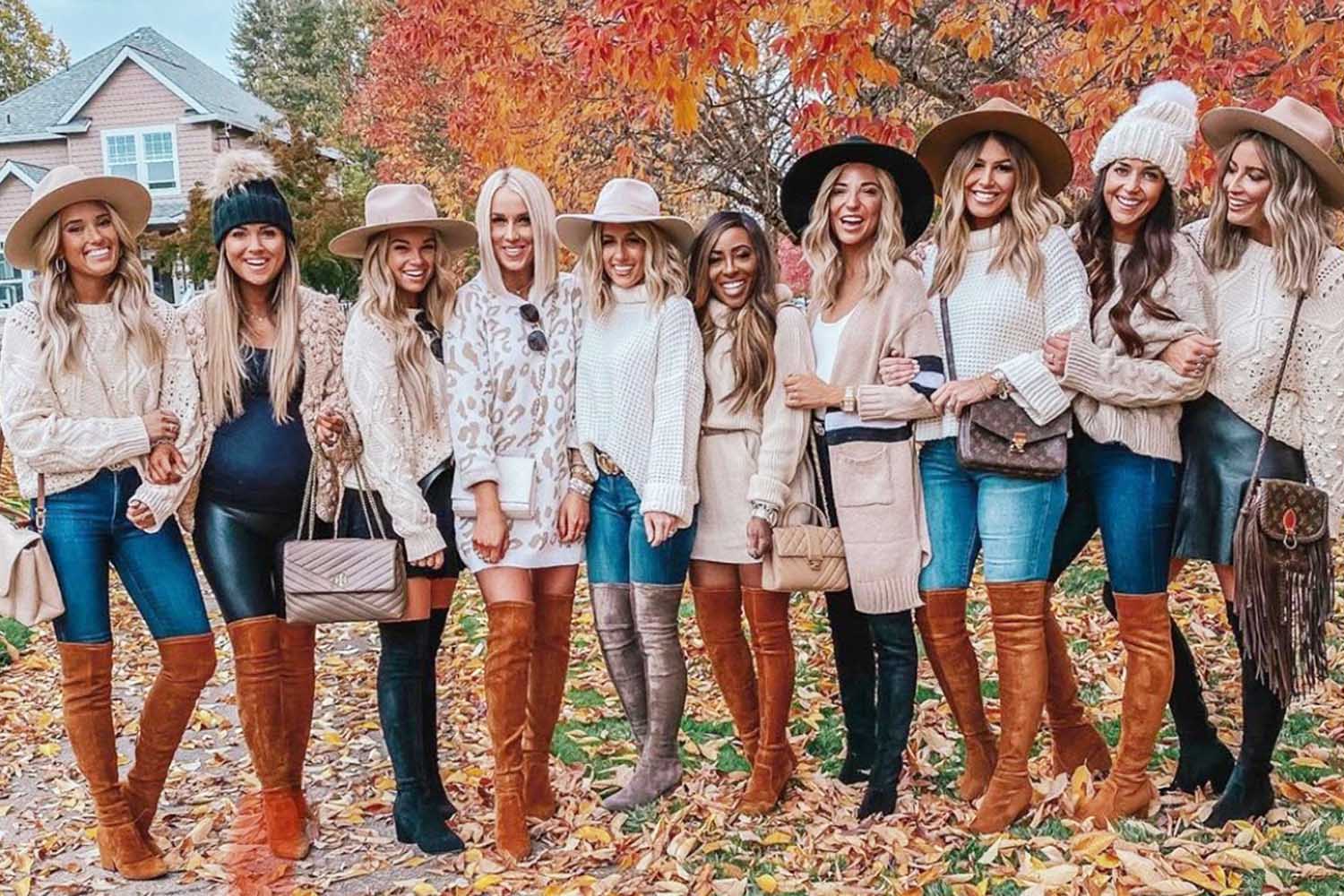With a hint of nutmeg in the air and knitted sweaters, large-brimmed hats and cozy flannels flooding your social feeds, you know that fall is finally here. What you might not know is that regular fall has actually been canceled. In its place rises “Christian Girl Autumn.” A meme. A mantra. A way of life for Octobers to come.
Hold on, what is “Christian Girl Autumn?”
The trend derives its name and much of its cachet from Hot Girl Summer, the summer 2019 mantra that awakened our inner unapologetic bad bitch.
In August 2019, Twitter user @bimbofication tweeted, “Hot Girl Summer is coming to an end, get ready for Christian Girl Autumn,” with a photo of two white women with long, wavy brunette hair dressed almost identically: oversized scarves, ripped denim jeans, brown booties and matching leather totes.
Naturally, other users replied with jokes assuming certain traits about the then-anonymous women who were dressed like your stereotypical, pumpkin spice latte-sipping basic white girls.
The tweet then gave rise to an entire genus of memes, with people posting about their transition from “Hot Girl Summer” into “Christian Girl Autumn,” and riffing on similar CGA poses.
The trend eventually found its way to Caitlin Covington and Emily Gemma, the two girls pictured in the initial CGA tweet. Covington, who runs the blog Southern Curls and Pearls, tweeted, “If all of Twitter is gonna make fun of my fall photos, at least pick some good ones! Super proud of these. For the record, I do like pumpkin spice lattes. Cheers!”
As the two women interacted with the memes and answered questions about their political leanings and stance on the LGBT community, Gemma and Covington attempted to distance themselves from some of the intolerant connotations the meme brought on — i.e., the insinuations that the two girls were racist and homophobic — and they eventually became icons among gay Twitter.
“If anything [the meme] brought everyone a little bit closer,” Gemma told Buzzfeed News. “People started realizing, ‘Oh, these girls are real. They’re not whatever we thought they were.’ They assumed we were anti-LGBT, but we’re not at all.”
So, we all want a Christian Girl Autumn now?
CGA began as a mockery of the “basic white girl in fall” aesthetic, a look that is often ridiculed for how repetitive and creepily common it is among lifestyle influencers and bloggers. Consider March 2020, when it was announced Coachella would be postponed to October 2020 due to the pandemic and Twitter responded with lots of jokes, including one viral tweet that imagined a Christian Girl Autumn-like crowd.
Last fall, however, more people began embracing the CGA movement, captioning their own autumnal photos with the phrase, unabashedly yearning for the comforting smell of pumpkin-scented candles and proudly sipping their PSLs. The appeal of a Christian Girl Autumn is unsurprising given our current, chaotic climate. Since the start of the pandemic, every day has felt like an endless, inescapable hellscape, and the charmed simplicity of a Christian Girl Autumn is thus heavily desired.
In an article for Vice, writer Hannah Smothers investigated why exactly she’s drawn to having a “Christian Girl Autumn,” noting that the initial CGA image of two girls gleefully smiling in larger-than-life scarves exuded “easy living and effortlessness.”
“It was initially mocked for its basicness, until the tide turned, and many realized that the line between basic and happy is often short and direct,” Smothers wrote. “Now Christian Girl Autumn exists as a fictional aspiration point; how big a scarf would you wear, if you had no worries in this world?”
For years we’ve engaged in illogical debates over whether Starbucks’ Pumpkin Spiced Latte was a valid, seasonal drink to be enjoyed or a gross fad adored by dumb women. Regardless, the PSL was stamped as “basic,” and no matter how much joy the warm cinnamon drink brought you, every time the barista would call out your PSL, you felt a pang of shame as you walked up to accept it.
But the world is on fire now, and serotonin is hard to come by, so if enjoying a flavored coffee or posting a photo of yourself in a pumpkin patch summons a rare bout of happiness, being labeled as an airhead is manageable.
Additionally, the CGA mantra gained even more love last year after the creator of the meme (@bimbofication) tweeted out a GoFundMe link to her followers to help with her gender-affirming procedures. Soon after, Covington donated $500 to the cause and retweeted the link, writing, “FYI this is the creator of the Christian Girl Autumn meme. Please help & donate to the Go Fund Me if you can!”
So in a twist of events, Christian Girl Autumn turned out to be a pretty wholesome meme that embraces inclusivity, confidence and personal happiness — a meme totally worth toasting a $6 Pumpkin Spiced Latte to.
This article was featured in the InsideHook newsletter. Sign up now.
